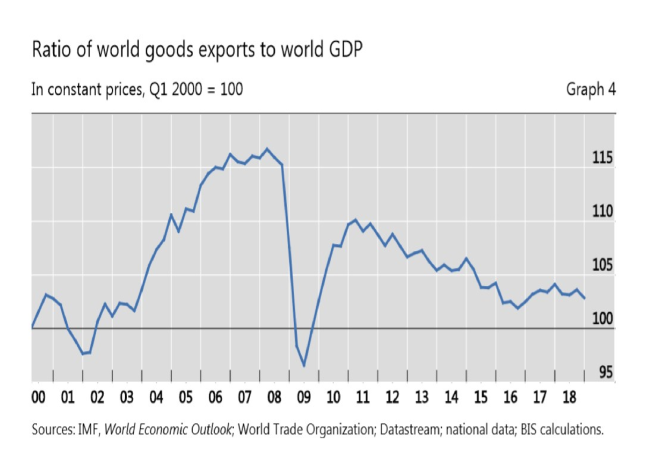INTEREST RATES, GLOBAL VALUE CHAINS AND BANK RESERVE REQUIREMENTS
Interest Rates, Global Value Chains and Bank Reserve Requirements
- Global Value Chains have suffered since 2009
- Despite low interest rates, financial costs remain too high
- Bank profitability has not recovered, yet banks are still too big to fail
In a recent speech, Hyun Song Shin, Head of Research at the BIS, discussed – What is behind the recent slowdown? The speech focused on the weakening of global value chains (GVC’s) in manufactured goods. The manufacturing sector is critical, since it accounts for 70% of global merchandise trade: –
During the heyday of globalisation in the late 1980s and 1990s, trade grew at twice the pace of GDP. In turn, trade growth in manufactured goods was driven by the growing importance of multinational firms and the development of GVCs that knit together the production activity of firms around the world.
The chart below reveals the transformation of the world economy over the past 17 years: –

Source: BIS, X Li, B Meng and Z Wang, “Recent patterns of global production and GVC participation”, in D Dollar (ed), Global Value Chain Development Report 2019, World Trade Organization et al.
Hyun’s next chart tracks the sharp reversal in the relationship between world trade and GDP growth as a result of the Great Financial Crisis (GFC): –

Sources: IMF, World Economic Outlook; World Trade Organization; Datastream; national data; BIS calculations
The important point, highlighted by Hyun, is that the retrenchment in trade occurred almost a decade before the trade war began. China, growing at 6% plus, has captured an increasing share of global trade at the expense of the developed nations, most notably the US. Europe went through a similar transition during the second half of the 19th century, as the US transformed from an agrarian to an industrial society.
…click on the above link to read the rest of the article…